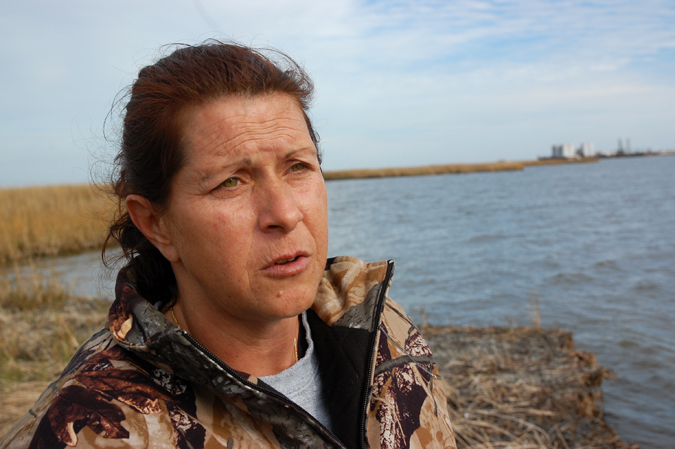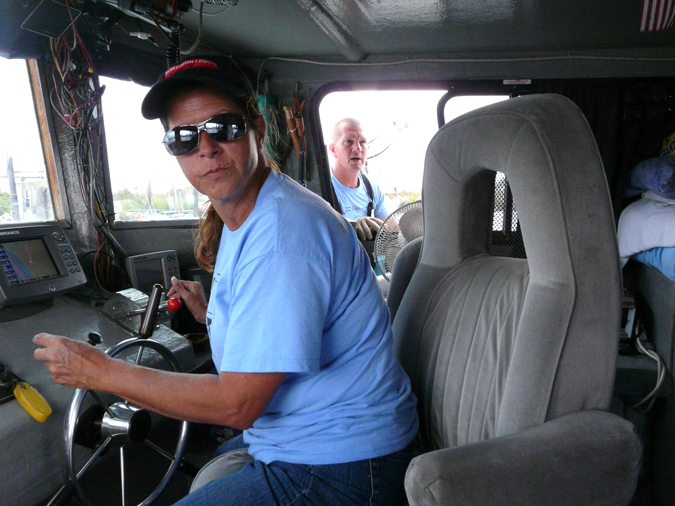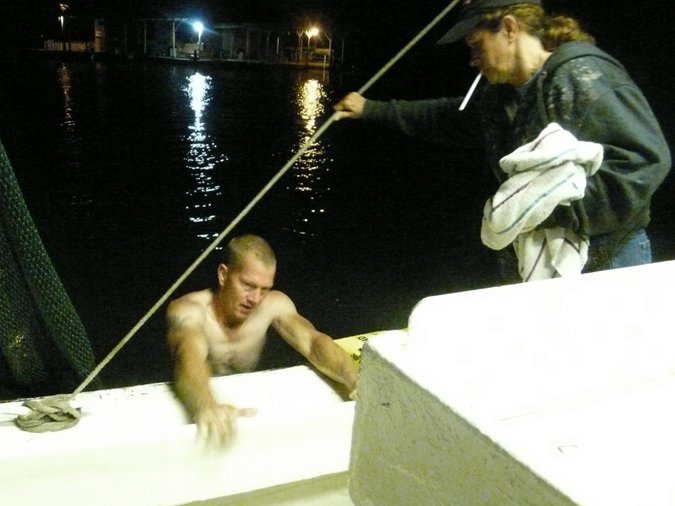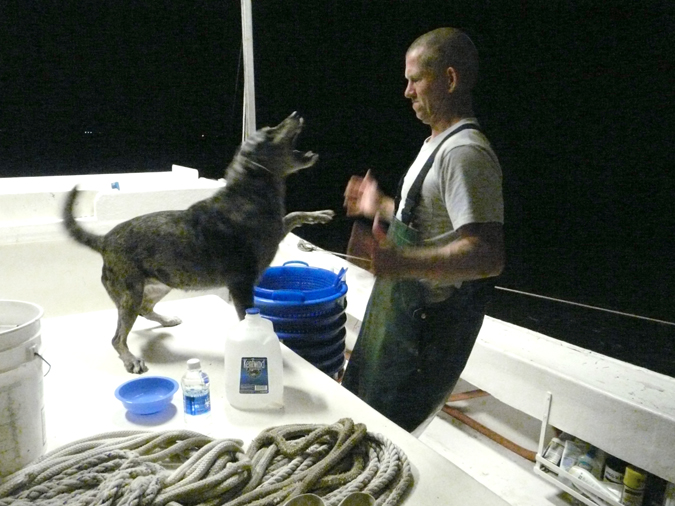During a long night on the bayou, one couple worries about the future.
Part 5 of Losing Louisiana, a series originally published in onEarth.

Darla Rooks in Bay Jimmy, one of the areas most hard hit by the BP oil spill. Photos by Barry Yeoman.
DARLA AND TODD ROOKS IDLE their shrimp boat, the Cajun Queen, at the edge of a marsh in Louisiana’s Grand Bayou, near the town of Port Sulphur. It’s 12:40 a.m., and a full moon lights up the Mississippi River Delta. The couple is waiting for the tide to start falling, forcing the shrimp to flee the protection of marsh grasses and swim into the open bayou. Once that happens, the work will be non-stop. While they wait, Darla, the boat’s captain, leaves the cabin to join Todd on the deck, a rare intimacy during the workday. She lights up a Benson & Hedges. Todd sticks a pinch of Skoal into his cheek and nuzzles their dog Dixie, a Catahoula cur. Together, they savor the stillness.
This is the Rookses’ third night back shrimping since the Deepwater Horizon blowout last April. After six months, it marks a return to the familiar to them. Both are from shrimping families. The dock they left 40 minutes ago is located at the same marina where Todd and his cousin used to climb down the levee as boys and steal Coca-Colas from empty oyster boats. Where we’re sitting now, we can see the faint lights of Happy Jack, the fishing community where Darla spent her childhood. Shrimping is part of the fiber of Plaquemines Parish, the 100-mile-long peninsula south of New Orleans where Darla and Todd live. In 2009, shrimpers pulled 19 million pounds from the parish’s 1,600 square miles of water, more than one-sixth of the state’s total harvest.
But both of the Rookses — and particularly Darla, the more talkative of the two — wonder whether their livelihood can continue. She worries that shrinking wetlands will reduce the Gulf’s shrimp population and make the area even more vulnerable to future hurricanes and oil spills. And she is not convinced the water is clean or the shrimp totally safe after the BP spill, despite official assurances. She continues to shrimp, cautiously, because she needs to survive. But she is also speaking her mind along the way.
DARLA ROOKS GREW UP ENTIRELY ORIENTED toward the water. Her parents caught shrimp and oysters to sell, shot alligators to eat, and trapped otters, nutria, mink and raccoon for their pelts. When she was not in school, Darla was likely to be found in the canal behind the family home in Happy Jack. “When most kids can’t even play in front of their houses nowadays, me and my brother were getting in a little flatboat, pulling ourselves down this bayou, skiing on a little skimmer board made out of plywood and rope,” she says. “We killed our ducks here. We caught crabs here. We had a blast.”
She also dreamed of a bigger world. “I decided that I wasn’t going to do what my daddy did,” she says — so at 17, she moved an hour away to Harahan, just outside New Orleans. Darla drove an ambulance, became an emergency medical technician, and transported bodies for the coroner’s office. “It wasn’t too long before I found out that all that stuff that was in town didn’t make me happy,” she says. She moved home, and in her twenties married Todd, who also grew up in a local shrimping family.
The couple — she’s 47, he’s 45 — began shrimping together full-time about 12 years ago. They bought the Cajun Queen in 2005; the 37-foot-long fiberglass boat is the second they’ve owned. Five months after they bought it, Hurricane Katrina battered Plaquemines Parish. The storm destroyed the rental house where they lived and blew their boat into a canal, where it sunk. By the time they recovered it, seven months later, it was covered with barnacles the size of nickels. The Rookses received $19,000 from FEMA, not enough to cover the damage. They made the repairs by themselves, then this year bought an $8,000 generator days before the BP spill.
THE DAY I SPEND WITH THE ROOKSES doesn’t start so well. With an east wind blowing, the tide in Grand Bayou is taking longer than usual to recede, causing the shrimp to hang back in the grass. At 2:40 a.m., Darla decides they can’t wait; in the distance, she sees the lights of what looks like a competitor’s boat. Todd pulls the lever that lowers the L-shaped aluminum frames that are attached to the nylon nets. Darla returns to the cabin, grabs the wheel, and takes the Cajun Queen for its first “push” of the night.

After a night of shrimping Darla Rooks steers the Cajun Queen into Port Sulphur. Her husband and deckhand Todd stands in the background.
When Todd raises the net again, what he sees are not shrimp but rather porgies and shad and croakers, which have no value to the couple. “All fish,” Todd says, wishing his wife would have waited before starting the push. “She’s just too nervous.” He unties the rope that holds closed the tails of the nets — the bottom of the funnel where the shrimp would normally be — and releases the useless bycatch into the bayou. He shakes the remaining fish loose from the nets as Darla doubles back to their starting point. That’s when she realizes her mistake: The lights she saw belonged to some oil-industry equipment. “Yeah, my boat was a rig,” she says, her hand on Todd’s shoulder. “Pat you on the back. You were right.”
Todd settles into the cabin to watch Mixed Martial Arts on TV. At 3:35 a.m., he tests the tide and finds it starting to lower. “Let’s try it,” he says.
“I don’t want to try it if we’re going to catch fish,” Darla replies, a bit gun-shy.
“Let’s go,” Todd says.
This time is the charm. A few minutes into the trawl, Todd briefly lifts one net to check the catch. “Fish is gone now,” he declares.
For the next six hours, Darla steers up and down Grand Bayou. She points out manmade canals cut the by the oil companies, which, along with the river levees, have hastened the loss of the delta’s wetlands. Less marshland means less habitat for young shrimp, she says: “They’re knocking out the breeding area. They’re knocking out their safety zone.”
Every so often, Todd lifts the nets, unties the ropes, and dumps the catch onto the boat’s fantail. Then comes the long process of separating the shrimp from the bycatch. Todd shovels the catch into a white plastic barrel that he has filled with salt water. If he gets the salinity correct (which he always does), the fish will float and the shrimp will sink. Todd dumps the fish overboard. He shovels the remaining shrimp into blue plastic baskets until he can pour them into the boat’s enormous foam-and-fiberglass ice chest. He stops long enough only to fetch a energy drink from the cooler. Dixie terrorizes the blue crabs, exacting revenge for an attack when she was a puppy. Darla pilots the boat up and down the bayou, feeling meditative. “It‘s a stress reliever,” she says, “It’s like riding a motorbike or painting a picture — you just have that one thing on your mind.”
THE BP SPILL SHUT DOWN THE ROOKSES’ shrimping business for five months. They received four weeks’ worth of clean-up work from BP’s Vessels of Opportunity program, and Darla believes they were cut loose because she wouldn’t stop speaking her mind about the oil. They were living with relatives at the time of the spill, but without an income, couldn’t afford to pay rent, and neither Darla nor Todd can stand being a freeloader. So they moved onto their boat, into a closet-sized cabin with twin bunk beds, a coffee pot, a small portable stove, and a microwave.
Not only were they suddenly in dire financial straits, but the ecosystem surrounding them was in ruins. “As we’d be going down to Venice to provide paperwork for our claims, and searching for a job hopefully working with BP, there were sea gulls dead all over the road,” Darla says. “They weren’t hit by a car. They didn’t have oil on them. There was nothing wrong with them that you could see. I actually saw a couple of them flying and drop out of the sky.”
She fell into despair. “At one point, I put a hangman’s noose on the back rigging of the boat. I was ready to stick my head in it,” she says. Todd had trouble dealing with his wife’s anguish. “I didn’t understand her side of being depressed,” he says. “She didn’t understand my side of getting mad. And I’d get mad at her for being depressed.” He pops open another Red Bull as he tells the story. “I can understand why there was all the divorces,” he adds. (Steve Picou, a University of South Alabama sociologist who studies the human impact of disasters, say there were “numerous divorces” after the Exxon Valdez oil spill. It’s too early, he says, to compile divorce data for the BP spill’s aftermath.)
A doctor acquaintance intervened when Darla felt suicidal. “He told me dead people don’t talk, dead people don’t sue, dead people don’t tell the truth, and dead people don’t bother BP. So I started thinking: You know what? I’m going to do what’s right and I’m going to tell the truth, even if it costs me financially.” Last month, at a town hall meeting in Buras, Rooks told a group of fisherman, “We need to stand up and fight or there will be nothing left. If you say nothing, you get nothing.”
One of the riskiest things for Darla to say is that she remains unsure that shrimp from oil-affected waters is healthy to eat. The Food and Drug Administration (FDA) and National Oceanic and Atmospheric Administration say Gulf seafood has been tested extensively and there’s no reason for alarm. “Although crude oil has the potential to taint seafood with flavors and odors caused by exposure to hydrocarbon chemicals, the public should not be concerned about the safety of seafood in stores at this time,” says the FDA’s website. Darla doesn’t feel so confident.
“I’m a seafood dealer. That’s how I make my living. And I’m telling people, when it comes from that area over there,” — she motions miles away — “do not eat it. I don’t care if the president of the United States, or the Queen of England, or BP, or the Coast Guard says it’s safe. If you get in shallow water five miles out and you kick up some dirt, oil comes to the top. It doesn’t stay there for long because it sinks back down because it’s been dispersed, but it does come to the top. And shrimp normally bury up in the mud in the middle of the day and come up at night when it’s nice and cool. [Now] they’re swimming on top of the water in 100-degree temperature during the day. I’m 47 years old and never seen that before in my life.”
That’s why Darla and Todd were slow to start shrimping even after the first areas reopened. “It took me that long to decide that the area that I chose to go in was clean. I had to keep seeing shrimp coming from that area that didn’t have oil products stuck in their gills, and crabs that didn’t have a funny color to them, didn’t have a funny smell to them. It took me that long to decide that OK, I’m going to take a chance with my conscience and sell that seafood.” While she’ll sell her catch wholesale, she still won’t sell it directly to a consumer. “If that individual got sick,” she says, “I would feel personally responsible.” She worries that by the time the water is clean again, “all the generations that know how to do it and can teach it to someone else will be dead already.”
AS DAWN APPROACHES, THE NET grows heavier each time Todd lifts the aluminum frame. The Rookses are now catching shrimp faster than Todd can sort them. He’ll need to finish sorting at the end of the workday.
Still, he keeps his equanimity. Most of the time Todd wears a patient, almost childlike smile. Then at 6 a.m., the cable connecting one of the nets to a 350-pound weight snaps. Todd’s eyes go wide for a minute; he shucks off his gloves and rubber overalls, strips down to his shorts, and dives 26 feet into the water to fix the connection. “It’s not just a job — it’s an adventure,” he says, smiling, as he emerges. “Now I’m really behind.”
The only time Todd fully loses his composure comes three hours later, when three airboats — perhaps used by surveyors, perhaps hired by BP to clean up the water — come barreling around a corner, cutting off the Cajun Queen and creating a fearsome wake. Todd’s blues eyes grow steely. He yells, waves his arms, gives the boats the finger, but they continue their acrobatics. This activity, called “swamping,” can damage property and threaten lives. Darla has known shrimpers who have lost thousands of dollars’ worth of catch overboard when their boats were swamped. “Todd’s been throwing fish at people [who swamp us],” Darla says. “It won’t kill ’em, but you know it when a porgie hits you at 50 miles an hour.”
Still, today’s harvest is shaping up to be respectable; the shrimp will later weigh in at 1,264 pounds — “not great, not horrible,” Darla says. At 9:45 a.m., they pull up the nets and move to a marsh where they can stop and continue sorting before heading inland. Three or four dolphins swim to the boat waiting for fish to be thrown overboard, while seagulls hover overhead. This is one of the favorite moments of the couple’s day, but both note that neither the dolphins nor the gulls are as abundant as they were before the spill. “A couple of years ago, there was so many dolphins, you could pet them,” Todd says.
The scarcity spooks Darla. “If all this stuff’s missing, are we next?” she says. “Are we the next thing on the extinction list?”
Strong words, she knows. But these days, she says, no one will stop her from speaking her mind. “I can’t be scared of Mr. Obama or Mr. BP or Mr. Coast Guard,” she says, “because Mr. All-Those-People put their pants on one leg at a time. They’re people just like me, and we have a right to this land.”





